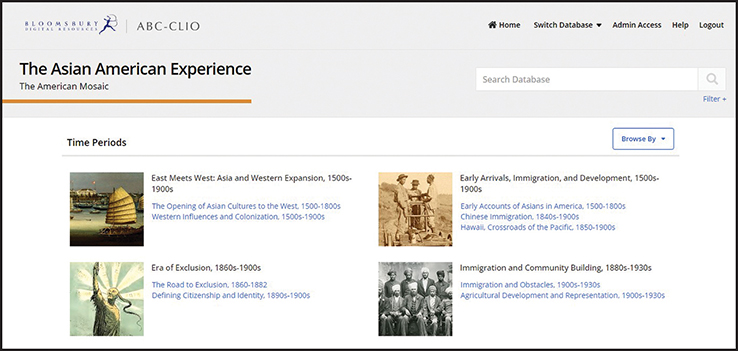The Asian American Experience | eReviews
The Asian American Experience database is an illuminating resource that offers unprecedented access to a range of materials centered on Asian American politics, arts and entertainment, literature, science, and more.
The Asian American Experience Bloomsbury/ABC-CLIO
CONTENT The Asian American Experience, one of four modules within Bloomsbury/ABC-CLIO’s American Mosaic Collection, traces the history of Asian American communities, from early trade interactions in the 1500s through late-20th-century and early-21st-century challenges and growth. The database covers a wide range of topics, including anti-immigration legislation, agricultural development, World War II, the Korean War, activism, refugees, contemporary immigration, post-9/11 backlash, and COVID. More than 2,000 primary sources (including images, audio clips, letters, cartoons, maps, government documents, magazine articles, timelines, and videos) are windows into the evolution of immigration policy, attitudes toward citizenship, and continuing racial tensions. A separate section on the World War II incarceration of people of Japanese descent in War Relocation Authority (WRA) camps offers deep coverage of the experiences of individuals living in the Heart Mountain, Manzanar, Minidoka, Poston, Gila River, Jerome, Rohwer, Tule Lake, and Topaz concentration camps. This content is presented through reference articles, government and court documents, letters, narratives, and audio and video clips, including individual remembrances, propaganda videos, and movie excerpts. While the resource’s coverage of East Asian American history and culture is especially robust, it also explores the history, culture, and literature of South and Southeast Asian Americans, Native Hawaiians, and Pacific Islanders. For instance, researchers will find information on topics such as Filipino American turntablism, Indian American poetry, Pacific Islander demographics, Hmong story cloths, Indigenous Polynesian dance, and Cambodian doughnut shops. Much of this information is presented through reference articles, rounded out by photos, illustrations, and government documents.
USABILITY The database’s homepage is attractively streamlined and easy to navigate. Users can access the content through the keyword search bar prominently located at the top of the page. Searches can be filtered by type of resource (reference articles, biographies, time lines), type of media (photos, illustrations, cartoons, audio, video), type of document (speeches, court documents, letters, newspapers), ebooks, and round table discussions. Additional filters allow researchers to search by seven available time periods, running from “East Meets West: Asia and Western Expansion, 1500s–1900s” to “New Millennium, 2000–Present.” When browsing the resource, students can access the database’s contents through three main tiles in the center of the homepage: “Time Periods,” “Subjects,” and “Japanese Incarceration: WRA Camp Experiences.” The “Subjects” tile offers a range of content headings, including economics and labor, performing and visual arts, sports and leisure, discrimination and exclusion, and immigration. Clicking into any of these headings leads to a comprehensive listing of related materials, which is easily searchable and filterable using the previously noted facets.
PRICING The Asian American Experience is available for purchase by subscription ($794 to $1,288) or by perpetual access ($4,758 to $7,722) with a mandatory annual update fee of $150 to $350. Pricing is based on size and type of institution, and discounts may be available from consortia.
VERDICT This illuminating resource offers unprecedented access to a range of materials centered on Asian American politics, arts and entertainment, literature, science, and more. Though most suitable for students at the undergraduate or high school level, the archive’s wealth of primary source documents makes it invaluable for anyone interested in Asian American culture or history.
RELATED
ALREADY A SUBSCRIBER? LOG IN
We are currently offering this content for free. Sign up now to activate your personal profile, where you can save articles for future viewing










Add Comment :-
Comment Policy:
Comment should not be empty !!!